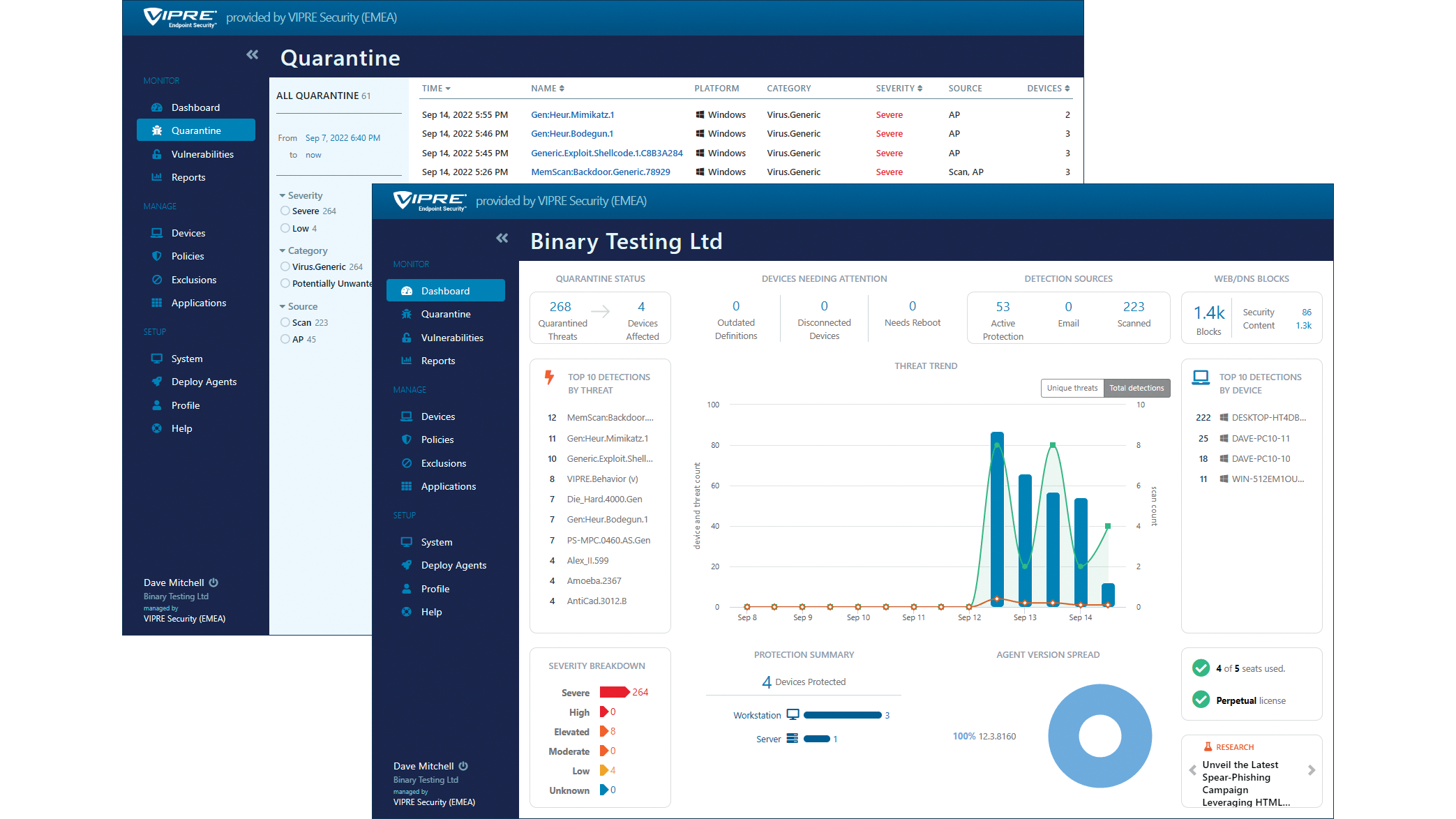Vipre Endpoint Security Cloud review: A sound choice for SMBs with Windows and Mac users
Lacking mobile support, but a great choice for SMBs seeking simple endpoint security at a good price

-
+
Easy to deploy
-
+
Lots of configurable options
-
+
Super-fast alerting services
-
-
Only macOS and Windows support

Vipre's Endpoint Security Cloud (ESC) offers strong protection at a pleasingly low price.
Costing around half that of many competing solutions, ESC presents a good spread of features including file, web and email anti-malware scanners, AI behavioural analysis to counter zero-day threats, a client firewall, intrusion detection and even patch management.
There are some compromises: Linux, Android and iOS devices are off the menu as ESC supports only Windows and macOS clients. You'll also have to wait for an endpoint detection and response service as Vipre advised us this is currently undergoing beta testing.
Deployment is straightforward. You can use the ESC web portal to email links to users or download the installer for manual setup. Either way, the agent takes ten minutes to install, connect to the portal and get updates. Once loaded, protection starts immediately. Clients are initially assigned a default security policy with all core protection services activated. Separate policies are provided for laptops, workstations and servers, which we found easy to clone and use as a base for our own custom policies.
There are plenty of configurable options, including real-time malware scanning, active protection that examines file accesses, malicious URL blocking and a host intrusion protection service (HIPS) to detect suspicious activity such as code injections. For email protection, ESC supports Outlook and other clients such as Thunderbird, where it scans attachments for malicious content and removes links to known phishing sites.
A web access control module is included as standard and provides 44 URL categories that can be blocked or allowed. A patch management module is also provided that currently supports 91 third-party apps and can automatically keep them updated, although ESC doesn't extend this service to Windows OS patching.
Separate policies are provided for Windows and macOS clients, with the latter having a more meagre portion of protection features. You can manage client access to the macOS agent, customise scan settings and enable active protection, but that's it.
Sign up today and you will receive a free copy of our Future Focus 2025 report - the leading guidance on AI, cybersecurity and other IT challenges as per 700+ senior executives
The web portal presents a clear overview of your security status, with a central graph showing threat activity and compromised systems over the past 14 days. Surrounding this are tables and charts showing details such as quarantined items, the top detections and affected systems, a threat severity breakdown and web-blocking activity.
Patch management is the least impressive component. The list of supported applications includes some that are of little value to businesses while some big names are absent. Still, ESC did provide a small list of detected apps on our clients and automatically updated them to the latest versions. ESC handled our test malware samples extremely well, as all of them were blocked on our Windows 10 clients with the agent interface providing pop-up system tray messages advising users of its actions.
We were also very impressed with Vipre's super-fast alerting services: after each malware sample had been detected, it updated the cloud console's threat tables almost instantaneously and issued email alerts in under a minute.
Reporting is good, too. The portal offers a range of predefined reports for detected threats, web activity, scan status and app updates. The web access control report is rather nifty as it presents bubble charts showing the most blocked URL categories and associated devices.
Client device support is limited but Vipre's Endpoint Security Cloud is a sound choice for SMBs with Windows and Mac users. All essential protection features are present, it handles malware infections efficiently and it comes at a very competitive price.
Dave is an IT consultant and freelance journalist specialising in hands-on reviews of computer networking products covering all market sectors from small businesses to enterprises. Founder of Binary Testing Ltd – the UK’s premier independent network testing laboratory - Dave has over 45 years of experience in the IT industry.
Dave has produced many thousands of in-depth business networking product reviews from his lab which have been reproduced globally. Writing for ITPro and its sister title, PC Pro, he covers all areas of business IT infrastructure, including servers, storage, network security, data protection, cloud, infrastructure and services.
-
 ‘Not a shortcut to competence’: Anthropic researchers say AI tools are improving developer productivity – but the technology could ‘inhibit skills formation’
‘Not a shortcut to competence’: Anthropic researchers say AI tools are improving developer productivity – but the technology could ‘inhibit skills formation’News A research paper from Anthropic suggests we need to be careful deploying AI to avoid losing critical skills
By Nicole Kobie Published
-
 CultureAI’s new partner program targets AI governance gains for resellers
CultureAI’s new partner program targets AI governance gains for resellersNews The new partner framework aims to help resellers turn AI governance gaps into scalable services revenue
By Daniel Todd Published
-
 Imperial College wants to train larger, more complex AI models – so it's teaming up with Digital Realty on a UK-first project
Imperial College wants to train larger, more complex AI models – so it's teaming up with Digital Realty on a UK-first projectNews Digital Realty’s Woking data center has been selected to run the project
By Emma Woollacott Published
